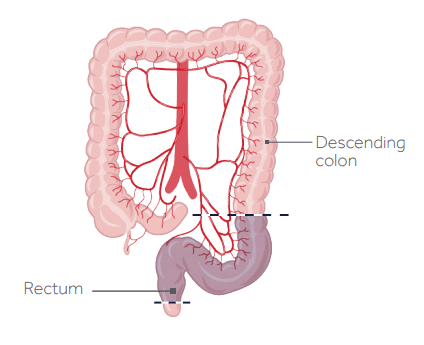Laparoscopic Surgery for Colon Cancer is also known as laparoscopic Colectomy. It is a minimal invasive surgical procedure in which the surgeon removes the tumour in the Colon, through the use of a laparoscope and surgical instruments. The minimal invasive surgical procedure used to remove rectal malignancy in the rectum and its surrounding areas through use of a laparoscope is known as laparoscopic surgery for rectal malignancy. The surgery is conducted by an expert Surgical Oncologists. The procedures are conducted to:
- Remove cancerous part of the colon and rectal area.
- To lymph nodes near the colon and rectal area which have been affected by cancer cells.
Why Laparoscopic Surgery for Colon and Rectal Malignancy is required.
The treatment of Gastric cancer through laparoscopic techniques is highly preferred by medical experts or the following reasons:
- Incisions for surgery are smaller as compared to open surgery.
- Lesser pain after the surgery.
- Recovery is fast and takes lesser time.
- Shorter period of hospitalisation.
- Lesser complications.
- Lesser time required for the bowel movements to return to normal.
How the procedure is done
Before the procedure starts the patient is administered with general anaesthesia. A laparoscope is inserted through a small incision to monitor the exact condition of the affected area and to monitor the removal procedure during the surgery. The surgeon makes two three small incision in the abdominal area, through the surgical instruments are inserted to conduct the surgery. The surgeon operates the affected part of the colon or the rectum and removes it along with the tumours or ulcers. After the procedure is over the surgeon stitches all the incisions and they are dressed appropriately.
Types of Laparoscopic Surgery for Colon and Rectal Malignancy Techniques
Laparoscopic techniques used for Colon cancer:
Hand assisted laparoscopic surgery: This procedure allows placement of a hand in the abdomen through devices to conduct the surgery, which helps in performing manulal dissections and retractions. The whole procedure is monitored through a laparoscope.
Laparoscopic techniques used for Rectal Cancer or Malignancy:
Hybrid and hand assisted laparoscopic rectal surgery: Here also a laparoscope is used to monitor the surgery. A small incision is created at the low midline, to treat the affected area through small surgical instruments.
Hand assisted laparoscopic surgery: If the tumour or the malignant cells are found to be deep within the rectum, then the hand assisted laparoscopic technique is used to treat the problem. Here through an open incision the hand is inserted with the help of devices to conduct the surgery.
The decision about which procedure to use is dependent on the location of the tumour, its size, age of the patient and the stage at which the surgery is being done.
Before Laparoscopic Surgery for Colon and Rectal Malignancy
The surgeon will mark the lesion or the part to be operated by first observing it with n endoscope carefully; this procedure is known as tattooing. Before the procedure the vital of the patient like temperature, blood pressure, blood sugar etc. will be taken. The patient may also be asked to go for blood test, CT scan, ultrasound, endoscopy, ECG, EEG X-Ray and other such tests. Intake of food and fluids will be stopped few hours before the surgery.
After Laparoscopic Surgery for Colon and Rectal Malignancy
After the surgery the patient is sent to the post operation room where he is kept for a few hours under observation. Then he is shifted to the ICU or Warding depending on the health condition of the patients. The patient is not allowed to food or liquid intake immediately after the surgery. The patient may have to stay in the hospital for a couple of days depending on the recovery rate. On discharge the doctor will prescribe medicines and advise on how to take care of the patient. He will call him for regular follow up visits. It takes few weeks for the patient to return to his normal routine life.
Risks involved
- Infection in the incision site
- Bleeding after the surgery.
- Complications due to anaesthesia
- Palpitation of the heart
- Abdominal pain
- Anastomotic leakage in case of rectal malignancy

